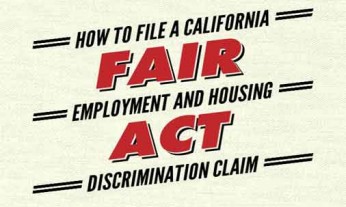 How can I file a California Fair Employment and Housing Act Discrimination Claim? If you work in the state of California and you believe that you have been the victim of employment discrimination, you do not have the immediate option of filing a lawsuit against your employer. You must first pursue a claim on the state level by filing a claim with the California Department of Fair Employment and Housing, also known as the DFEH, or the federal level by filing a claim with the Equal Employment Opportunity Commission, also known as the EEOC.
How can I file a California Fair Employment and Housing Act Discrimination Claim? If you work in the state of California and you believe that you have been the victim of employment discrimination, you do not have the immediate option of filing a lawsuit against your employer. You must first pursue a claim on the state level by filing a claim with the California Department of Fair Employment and Housing, also known as the DFEH, or the federal level by filing a claim with the Equal Employment Opportunity Commission, also known as the EEOC.
If you choose to file a complaint with the DFEH regarding a matter that falls under the jurisdiction of the EEOC, then your complaint will also be filed with the EEOC automatically.
Filing a Discrimination Claim with the DFEH
If you choose to pursue a claim on the state level, alleging a violation of California’s Fair Employment and Housing Act (FEHA), you should be aware of the steps involved in the complaint process.
The Interview
When you contact the DFEH, they will schedule a time to interview you about your case. The DFEH provides a written questionnaire and they ask that complainants fill it out and send it in prior to their interviews.
Filing the Complaint
After the interview is complete the consultant who conducted the interview will draft a formal complaint that may or may not be accepted for investigation. The respondent (that is, the employer you have filed a complaint against) will be required to answer the complaint.
The respondent will be given the opportunity to resolve the complaint voluntarily, and the DFEH will attempt to facilitate a voluntary settlement. If a respondent makes an offer that the DFEH feels is reasonable and the complainant rejects it, the DFEH may choose to take no further action on their complaint.
The Investigation
If your complaint has been accepted for investigation, the DFEH is required to perform the investigation in a standard, timely manner. If the investigation does not show that the respondent violated the law, then the case will be closed. If the investigation shows that the respondent violated the law, then the DFEH may issue an accusation of discrimination.
Conciliation
If the investigation shows that there was a legal violation, there will be formal conciliation conferences. At a conciliation conference, the DFEH will present its conclusion that the respondent violated the law and there will be an attempt to reach a settlement between the parties. If there is no settlement, then the complaint may reach the litigation stage.
Litigation
The DFEH may choose to prosecute the respondent. If this occurs, the respondent may choose to either have the case publicly litigated before the Fair Employment and Housing Commission or moved to civil court.
Remedies
When a complainant is successful in litigation, there are a wide array of remedies available to him or her, including back pay, emotional distress damages, and reinstatement to his or her job.
The Benefit of an Attorney
You may wish to be represented by an attorney throughout the complaint process. The counsel of an experienced attorney can considerably strengthen your odds of success. If you live in Sonoma County, Mendocino County, or Lake County California, the employment and labor law attorneys at Beck Law P.C. in Santa Rosa can help. We have have years of experience representing both plaintiffs and defendants in employment cases, and can advise you on how to proceed throughout each step of the complaint process.
